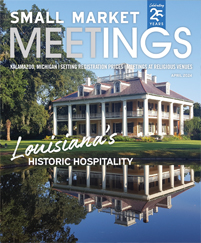An easy way to take an event to the next level is to incorporate the turquoise waters, white sand and warm sun of a Caribbean Island.
Island destinations elevate any meeting or event by combining business with leisure and are an exceptional choice for incentive travel and corporate retreats. While planning an event in the Caribbean does present certain challenges that a domestic event might not, it also comes with plenty of perks.
Here’s some insight from industry experts to help you reap the rewards and avoid the pitfalls of meeting in Caribbean destinations.
Depend on a DMC
It can be tricky to plan an event from another continent. Everything from local traffic changes to venue closures can become issues for planners to navigate. And if these details are not handled correctly, it could spell disaster for an event. One way to increase your destination event’s chances for success is to use a destination management company, or DMC.
DMCs are travel experts based in a destination; they manage anything inbound to the area and are knowledgeable about all things local, from hotels to transportation to activities.
“Rely on your destination management company,” said Andy Ortiz, president and owner of Global Incentive Management DMC, a DMC specializing in events in Mexico and the Caribbean. “We want the business to come to our destinations.”
DMCs are great resources for planners looking to source venues and suppliers for their events because they know the area well. They can secure good deals for planners when booking and offer helpful hints about events in the area. For example, if a planner arranges for their attendees to arrive at the hotel via a shuttle from the airport, it may be helpful to know the shuttle takes a lengthy route with 20 stops before it gets to the hotel; this is something a DMC agent would know.
“We often partner with DMCs for certain services at the destinations,” said Mike May, owner of Brightspot Incentives and Events, an event planning company specializing in incentive travel. “They’re going to know the best new restaurants; they’re going to know which transportation company provides the most modern buses.”
DMCs can also help when things go awry, because they’re usually based in the destination itself. If an attendee arrives a day earlier or later than anticipated, DMCs may be able to help make arrangements to accommodate them.
Keep an Eye on the Budget
A Caribbean getaway doesn’t have to break the bank. While it may initially strike some planners as unaffordable, there are some approaches to make an event more doable.
One strategy for optimal pricing is choosing an all-inclusive property as opposed to piecing the event together a la carte. This is a major difference from meeting planning in the U.S., where all-inclusive properties are rare.
“When we do a meeting or incentive group in the Caribbean, we usually go with an all-inclusive; so it’s one price and there are no surprises,” said Terese Ternullo, founder and owner of Hibiscus Travel, an event planning company specializing in travel to Jamaica.
Ortiz also recommends choosing all-inclusive properties whenever possible because they include tax, gratuity and hidden costs that planners may not initially think about. According to Ortiz, some Caribbean or Mexican-Caribbean destinations now consist of mainly all-inclusive properties because they recognize the draw to planners.
“You don’t have to break it down,” said Ortiz. “Everything is included in one package, and that’s very attractive to planners.”
A drawback to pricing in the Caribbean is import duties. According to May, fees associated with importing certain items for a destination event can double the cost. He added that food costs may be higher as well because ingredients have to be transported to the island.
Another factor impacting travel costs in the Caribbean is the post-COVID travel boom, which May refers to as “vacation inflation.”
“There’s a surge in demand, and at the same time there’s inflation, so it’s kind of creating a perfect storm of rising costs,” said May. To compensate for this, planners will want to keep a close eye on their budget.
Travel Can Be Tricky
One of the first questions attendees — and planners — ask when planning an event in the Caribbean is “How will I get there?” The answer, and the associated cost, will vary from group to group, which is something planners must consider.
The good news is that most attendees can secure their passports and get through immigration with ease because these destinations specialize in international tourism. However, any international travel from the U.S. requires some level of planning ahead from attendees, so making them aware of any travel requirements such as documents, immunizations or local health codes is important.
Flight logistics are an element to consider. A group will have an easier time flying in from Florida than from the West Coast, for example. But if each attendee is responsible for their own flying arrangements, this may also change the level of thought a planner must put into designing the event.
“What we always think of first is airlift to the destination,” said May. “One of the downsides for the Caribbean is it has fewer direct flights.”
Fewer direct flights translates to higher costs, especially as fuel prices rise globally. Other problems such as cancelled flights or weather conditions can also cause headaches for event management, so an added layer of contingency planning is a must.
“We have a lot of airline problems that have been happening recently,” said Ternullo.
Ground transportation is something else that needs to be considered, because local transportation can vary greatly from island to island. Attendee arrival times can change what options for ground transport are available. It’s easier to arrange local transportation for a group arriving on one than for a series of people arriving on different flights over two days.
Use Your Destination Wisely
The Caribbean is ideal for incentive travel because it has what May calls “podium power,” meaning it’s a high-value destination for many prospective attendees when compared to a domestic destination. It attracts a lot of attention because of the luxury associated with it, making it a great reward.
“The Caribbean creates a certain branding or expectation for the meeting,” said May. This might mean less emphasis on work and more emphasis on vacation for the attendees.
Because of this association with the Caribbean and the cost associated with travel, it’s ideal for longer events rather than quick trips. It may not be ideal for a two-day conference because attendees want to be able to enjoy their time on the island.
Planners can often get more bang for their buck in the Caribbean, which can really add to an event’s charm. The island backdrop may help save on décor cost, and it only increases the luxurious feel of the resorts and hotels where these events are hosted. Ortiz said that certain aspects of an event often are higher quality in the Caribbean than domestically.
“Especially in the Mexican Caribbean, the service level, the price, the food, the people are 100% different,” said Ortiz.
“I can set up a beautiful sit-down dinner or private parties, and a lot of times this really wows the employees,” said Ternullo, who said these additions are sometimes made possible because of the savings in service costs.
Caribbean destinations are designed to impress, and because their money may go further there, planners should have no difficulty designing something that’s going to going to maximize the attendee experience.











